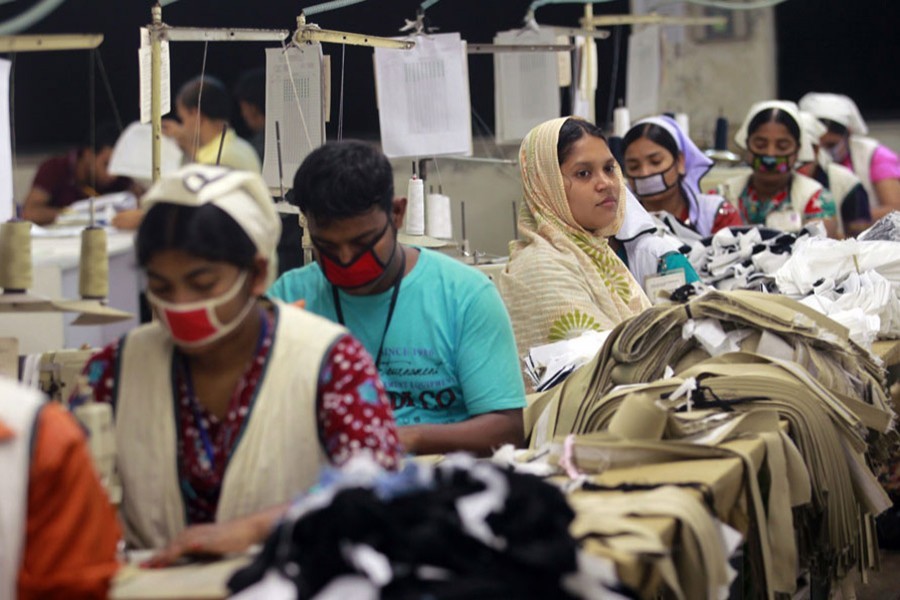A recent report released by the New York-based rights group Human Rights Watch (HRW) has come up with what looks like a scandalous reality often not heeded to while taking note of the inadequate rights situation prevailing in cheaper apparel exporting countries. The report titled 'How Apparel Brand Purchasing Practices Drive Labour Abuses' says business practices of global apparel brands such as offer of low prices and shorter manufacturing times are fuelling abuse of garment workers in Bangladesh and other supplying countries. The various cost-cutting methods by factories in these countries that harm workers are actually driven by the reckless profit motive of the global brands buying the products, the report concludes. Low prices and shorter times for manufacturing, coupled with poor forecasting, unfair penalties and poor payment terms have been identified the main factors exacerbating the risks for labour abuses.
The report is based on interviews with industry experts, garment factories supplying to numerous global brands, local rights groups and workers in Bangladesh, Cambodia, India, Myanmar and Pakistan. Many global brands, the report says, flaunt their commitment to ensuring rights-respecting workplaces that produce their goods, but undercut their efforts with pressure on suppliers to drive down prices. The report mentions that the sourcing policy of the buyers is not merely a threat to factories' financial bottom line, it also forces factories to engage in abusive labour practices and in risky subcontracting with unauthorised suppliers as a way of cutting costs. Overtime-related violations are an open industry secret and factories hide the number of hours workers actually work to pass compliance audits and find innovative ways of bypassing overtime wage regulations, the report adds.
The report identified steps apparel brands should take to correct poor purchasing practices and mitigate the risks of supply chain abuses.
It said brands should adopt and publish policies on responsible sourcing and integrate them across all departments and they should publish lists of their factories in accordance with the Transparency Pledge, a minimum standard developed in 2016 by a coalition of labour and human rights organisations.
Coming to the situation of Bangladesh, it is well known that factory owners here have been raising their concern over poor prices that, they contend, largely inhibit better wages to workers as well as hold back improved working environment. Last week, at a meeting held in the Dhaka Chamber of commerce and Industry, garment exporters called on the buyers and retailers to come forward to ensure a sustainable readymade garment sector in Bangladesh through increasing prices of products.
As pointed out in the HRW report, it is highly ironic that while global garment retailers insist on transforming garment factories into green production units at substantial costs, there is no sign of even a marginal hike in the prices. Since the incidents of Tazreen fire and Rana Plaza building collapse that shook the entire garment industry with potential threats for the future, the country's garment factories have undergone large-scale renovation works to ensure safety of workers. The two representative agencies of international buyers - the EU-based Accord and North America-based Alliance, along with local inspection agencies have successfully accomplished the task of factory remediation in respect of, reportedly, eighty per cent of the 5,000 garment factories. Along with the factory remediation works, there have been a lot of proactive moves by a good number of large factory owners in that they advanced far ahead turning their factories into green factories. This involves a major shift in energy and environmental design of factories and significant investment in eco-friendly production processes. In a short time, surprisingly indeed, the country topped the list of garment producing countries in the number of full-fledged green factories.
Although factory remediation has brought about a sea change in the working atmosphere of garment factories, global retailers are still stuck to their policy of paying as little as possible --let alone offering a bit extra while buying from these factories. A local daily recently reported that green garment factory owners, who spent huge amounts for setting up these units, are dismayed as their efforts are not rewarded by international retailers by way of higher prices. It has been learnt that construction cost of these factories is 20-30 per cent higher than the regular ones because of the special design and introduction of newer technology.
It is well known that at the beginning when Bangladesh started exporting readymade garment to North America and the European Union in the early eighties, prices offered were bare minimum. This, understandably, was because of low wage and relatively low cost in installing factories many of which were not in harmony with international standards. Besides, the country -- a new entrant to the competitive global apparel market -- was not in a position to bargain for reasonably higher prices. On the other hand, retailers aware of the weaknesses of the factories, often exposed to risks including life threatening ones in many cases, were hardly concerned as long as their procurement went hassle-free, that too by offering very little in terms of prices. The situation is entirely different now. While initially, the factories were mostly engaged in low-end bulk products, over time many of them have moved to the high-end segments of apparel products.
This is a reality that must not be ignored by retailers. After all, sourcing from a ramshackle factory cannot be matched with that from a state-of-the-art one. There should also be concerted efforts from the industry to bring home this point. Recently, there were moves from the garment workers' unions for wage hike, and although a minimum wage has been set, it is far below the wage structure demanded by the workers and endorsed by rights groups, civil society and the media. The owners' argument that raising workers' wage is contingent on fair price of their products cannot be sensibly dismissed as a dull excuse.
Given the situation, one feels that the country had better shed the cheap supplier tag and bargain for fair prices.


